Elementor vs Hostinger Website Builder: Final verdict
Elementor and Hostinger Website Builder both offer robust website building solutions, but they cater to different needs and preferences.
Elementor (Overall Grade: 7.4/10)
is a powerful website builder plugin for WordPress, known for its flexibility and extensive customization options. It excels in design functionalities, ease of use, and advanced marketing tools. When comparing Elementor vs Hostinger Website Builder, Elementor is ideal for users who need a highly customizable platform with a wide range of widgets and templates, making it suitable for both beginners and professional web designers.
Hostinger Website Builder (Overall Grade: 7.1/10)
is a user-friendly platform that simplifies website creation with its drag-and-drop interface. It offers affordable pricing, reliable hosting, and solid customer support. Considering Elementor vs Hostinger Website Builder, Hostinger Website Builder is perfect for small businesses and individual sellers who need a straightforward and cost-effective solution for setting up an online presence.

|

|
|
|---|---|---|
Design functionalities & templates |
9.2 |
8.5 |
Ease of use |
8.8 |
8.3 |
Ecommerce |
7.6 |
6.1 |
Website Editors |
8.5 |
7.4 |
Product testing options |
5.6 |
6.7 |
Price |
8.0 |
9.0 |
Hosting quality |
7.8 |
7.2 |
Website speed optimization |
6.7 |
8.2 |
Plugins/extensions and integrations |
7.6 |
4.7 |
Marketing features |
7.8 |
5.8 |
Customer support |
7.2 |
7.2 |
Website security |
9.1 |
8.2 |
AI capabilities |
7.4 |
6.1 |
User Management |
8.8 |
6.3 |
Which one is the best for ecommerce: Elementor or Hostinger Website Builder?
 7.6
7.6
 6.1
6.1
Verdict
: Hostinger Website Builder is suitable for small businesses and individual sellers, while Elementor excels in customization and flexibility for more complex ecommerce needs.
Elementor
: Known for its robust integration with WooCommerce, Elementor offers extensive customization options and a wide range of ecommerce widgets. This makes it ideal for businesses that require a high level of flexibility and detailed control over their online store. However, when comparing Elementor vs Hostinger Website Builder, Elementor might be more complex for beginners due to its advanced features.
Hostinger Website Builder
: Its user-friendly interface and straightforward ecommerce features make it perfect for small businesses and individual sellers. The platform offers essential tools for managing an online store, but it may lack the advanced customization and flexibility that more complex businesses might need.
Which one is the best for informational and business websites?
 8.9
8.9
 7.9
7.9
Verdict
: Elementor is the superior choice for creating informational and business websites, offering greater design flexibility and a higher ease of use score compared to Hostinger Website Builder.
Elementor
: Elementor excels in providing a highly customizable and flexible platform for building informational and business websites. With a score of 8.9, it offers a wide range of widgets and templates, making it suitable for both beginners and professional web designers. Its drag-and-drop interface and extensive design functionalities allow users to create visually appealing and responsive websites without needing to write code. Elementor’s integration with various WordPress themes and plugins further enhances its versatility, making it a top choice for those looking to create detailed and dynamic informational sites.
Hostinger Website Builder
: Hostinger Website Builder, with a score of 7.9, is a user-friendly platform designed to make website creation accessible to everyone. It offers a drag-and-drop interface and a variety of customizable templates, making it easy to build a website without any coding knowledge. While it provides solid performance and a range of features, it may lack the advanced design flexibility and extensive integrations that Elementor offers. Hostinger Website Builder is a good option for those looking for a straightforward and affordable solution for creating informational and business websites, but it may not meet the needs of users seeking more advanced customization options.
Elementor vs Hostinger Website Builder: Detailed comparison
Design functionalities & templates
Design FunctionalitiesRepresents how well each platform allows for creative design and customization of websites.Score Components:
- Template Variety (30%): Range and quality of design templates.
- Customization (30%): Flexibility and options for design alterations.
- User Interface (20%): Ease and intuitiveness of the design process.
- Responsiveness (10%): Adaptability to different devices and screen sizes.
- Innovation (10%): Unique design features and tools.
 9.2
9.2
 8.5
8.5
🏆
Winner: Elementor.
If you’re looking for a platform that offers more creative control and a wide array of design features, Elementor is the preferred choice.
Elementor offers an extensive range of templates and designs, with over 100 responsive website kits covering various categories like business, creative, education, and more, directly available through Elementor’s platform. Additional sources like Envato Elements, Template Monster, and others provide a wider selection, including free and premium options, catering to diverse web design needs.
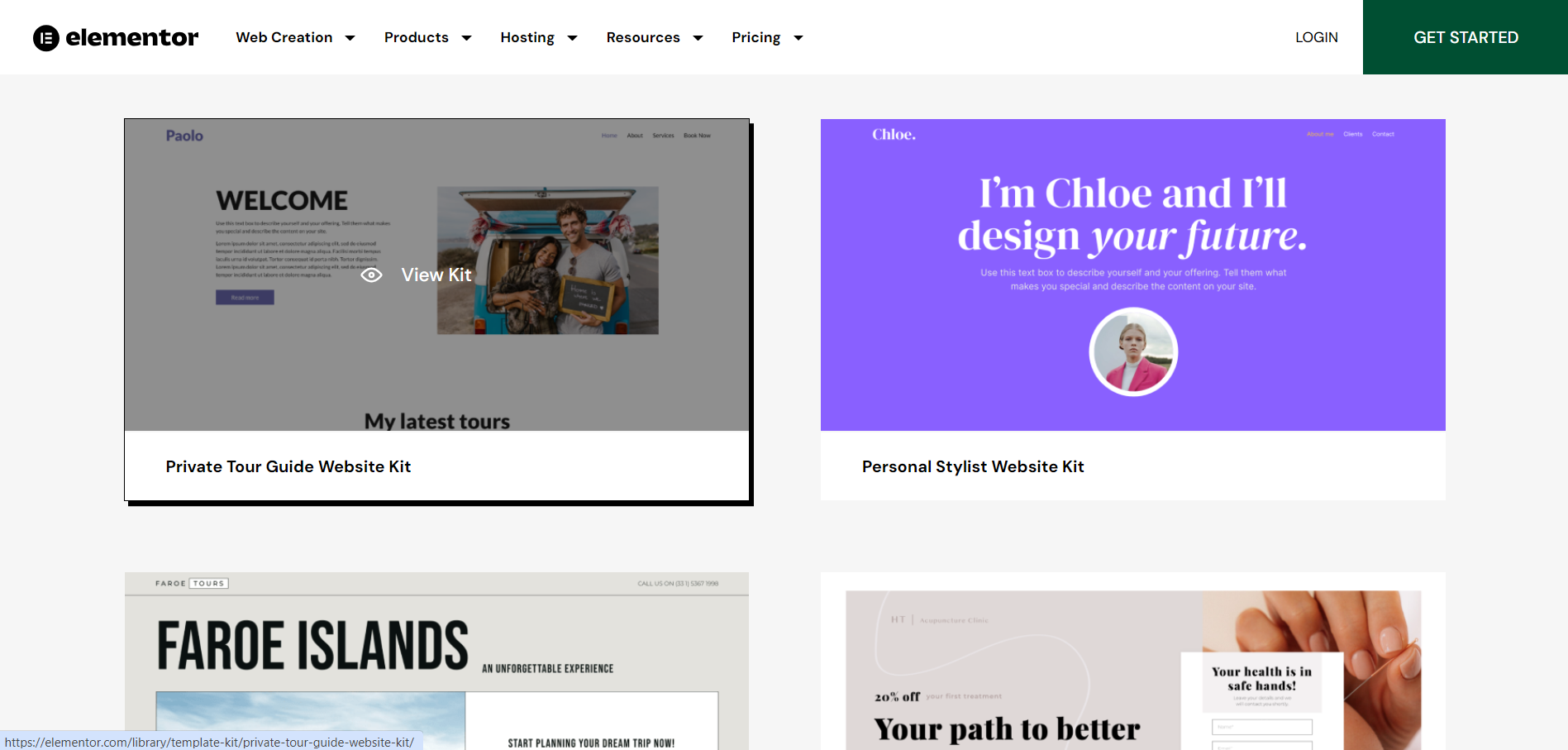
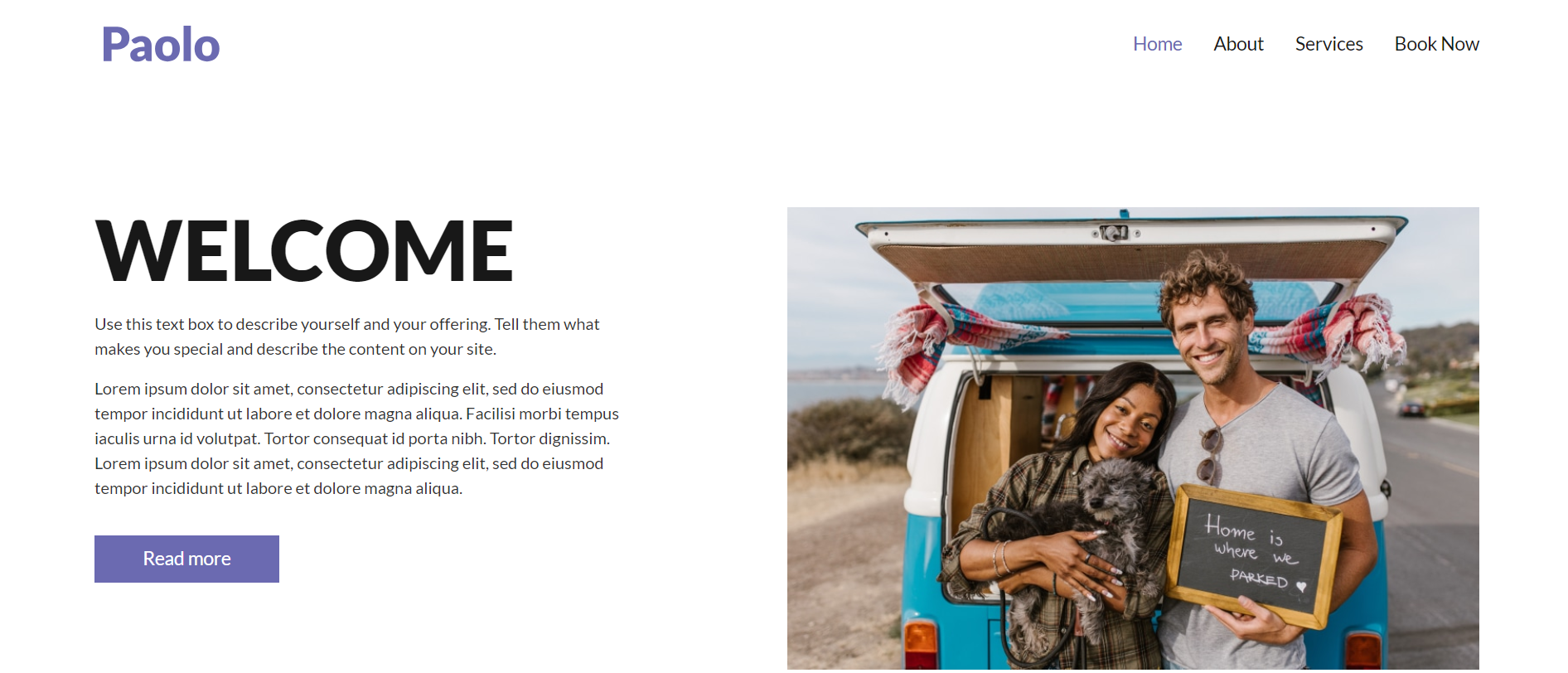
Compared to Elementor, Hostinger Website Builder offers an extensive collection of over 140 templates across various categories, including business, portfolio, blog, ecommerce, restaurant, and landing pages. These templates are fully customizable, providing design flexibility with the ability to adjust colors, fonts, layouts, and incorporate unique brand elements, while ensuring mobile responsiveness for optimal viewing on all devices.
Hostinger Website Builder Themes
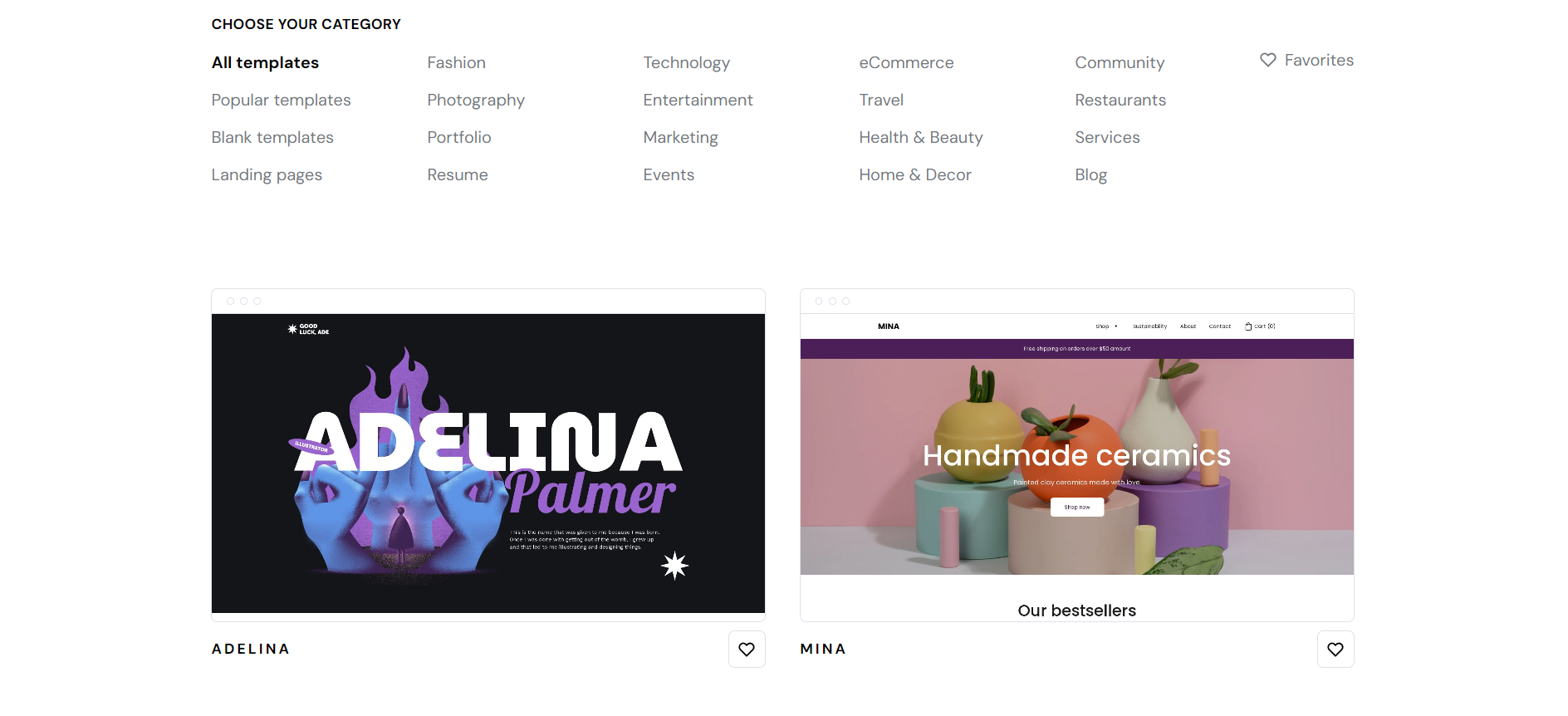

Get a head start on website creation with AI
Create a custom website tailored to your business needs 10X faster with 10Web AI Website Builder!
Ease of use
Ease of useReflects the platform’s overall user-friendliness.Score
Components:
- Learning curve (40%): Quickness and ease of getting started.
- Interface design (30%): Simplicity and intuitiveness of layout.
- User guidance (20%): Quality of tutorials and support.
- Flexibility (10%): Adaptability to various user skills.
 8.8
8.8
 8.3
8.3
🏆 Winner: Elementor
. With a score of 8.8, Elementor edges out Hostinger Website Builder (8.3) in terms of ease of use. Elementor’s user-friendly interface, drag-and-drop functionality, and wide range of pre-designed templates and widgets make it a flexible and intuitive platform for building websites. Hostinger Website Builder, while user-friendly and accessible, may have limited code editing and fewer advanced features compared to Elementor.
Learning Resources
🏆 Winner: Elementor
. Both platforms offer solid learning resources, but Elementor goes a step further with its Elementor Academy and a wide array of resources suitable for both beginners and advanced users. Hostinger Website Builder offers a variety of well-crafted learning resources, but finding specific information within the extensive Help Center can be challenging.
For ecommerce
EcommerceMeasures the platform’s effectiveness in supporting online business activities.Score Components:
- Ecommerce themes and templates (20%): Variety and design of templates.
- Product management (25%): Ease of managing and organizing products.
- Payment options (25%): Variety and convenience of payment methods.
- Ecommerce features (20%): Features for managing an ecommerce store.
- Integration (10%): Compatibility with external e-commerce tools and services.
 7.6
7.6
 6.1
6.1
Elementor and Hostinger Website Builder both offer ecommerce capabilities, but they cater to different needs and audiences. Elementor, with its robust integration with WooCommerce, provides a more comprehensive set of ecommerce features, making it suitable for businesses that require extensive customization and flexibility. On the other hand, Hostinger Website Builder, with its more basic feature set, is more suitable for small businesses and individual sellers who need a simple and straightforward platform for setting up an online store.
 |
 |
|
|---|---|---|
Ecommerce themes and templates |
7.8 |
6.5 |
Product page customization |
8.4 |
5.8 |
Payment processing and commissions |
7.5 |
7.0 |
POS capabilities |
5.5 |
4.5 |
Payment gateways |
7.0 |
7.5 |
Product numbers |
7.0 |
6.0 |
Additional ecommerce features |
8.0 |
6.2 |
Elementor ecommerce features:
- WooCommerce Integration
- Customizable Product Pages
- Ecommerce Widgets
- Product Categories and Filters
- Shopping Cart Customization
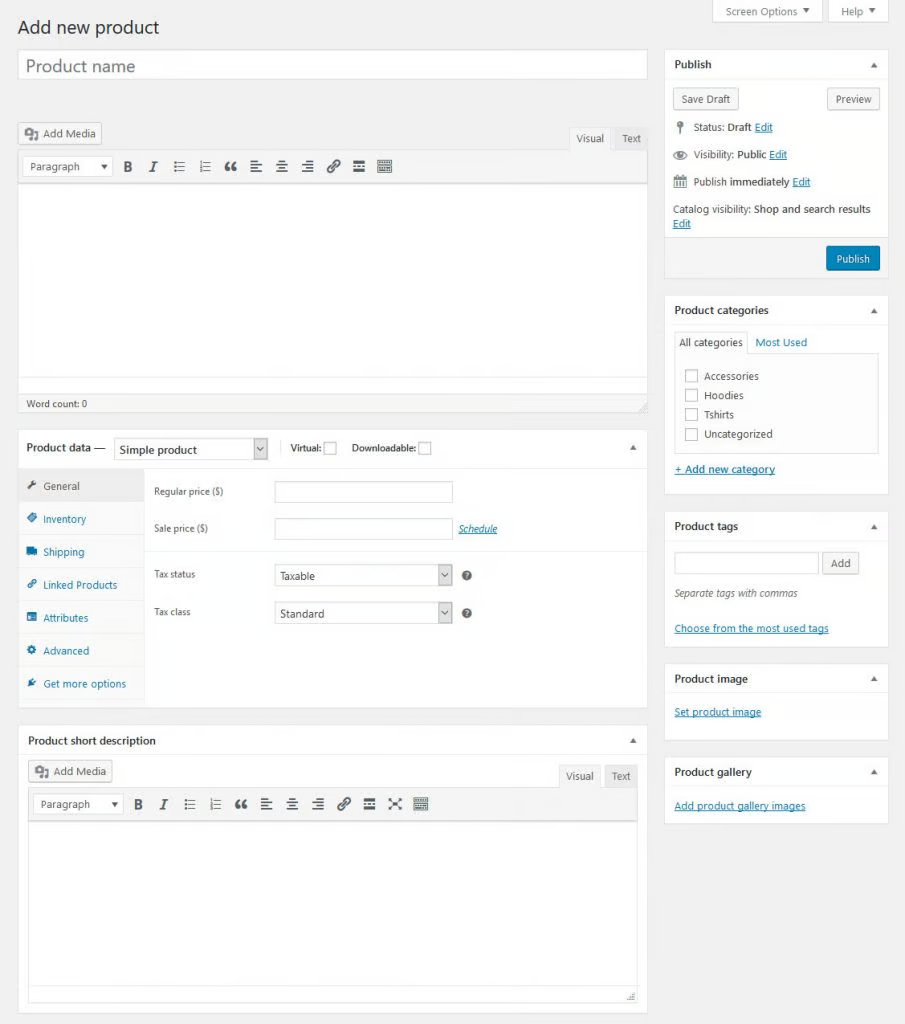
Hostinger Website Builder ecommerce features:
- Product Catalog Management
- Inventory management
- Taxes and shipping
- Payment gateways
- Order management
- Discount coupons and promotions
Ecommerce themes & templates
Elementor offers a diverse range of ecommerce-specific templates suitable for various online stores. These templates are designed to be mobile-responsive and SEO-friendly, ensuring optimal performance across devices and search engines. On the other hand, Hostinger Website Builder provides over 50 ecommerce templates out of its library of 140+, covering various styles and industries. These mobile-responsive templates offer pre-built functionalities such as product pages, shopping carts, and wishlists.
Product page customization
Elementor offers extensive customization options for WooCommerce product pages, including custom layouts, WooCommerce widgets for various product elements, and options for styling product galleries and ‘Add to Cart’ buttons.
In contrast, Hostinger Website Builder’s product page customization includes editing basic elements, adjusting layout and design, and optimizing SEO settings. However, it falls short in terms of flexibility due to limited code access, restrictions on creating entirely new custom sections, and theme-specific limitations.
Payment processing
When it comes to payment processing, Elementor supports several payment gateways, notably through plugins and integrations, with Stripe and PayPal being prominent options for simple and widespread use.
Hostinger Website Builder provides basic ecommerce features, supporting popular payment gateways like PayPal, Stripe, and Square with no additional platform commissions on sales. However, it lacks built-in payment processing and integrated point-of-sale capabilities, necessitating reliance on third-party gateways and separate systems for in-person transactions.
Website Editors
Website EditorsEvaluates the platforms’ website building and editing capabilities.Score Components:
- Customization tools (40%): Range and power of editing features.
- Editor usability (30%): User experience within the editor.
- Design flexibility (20%): Freedom in layout and design changes.
- Update and maintenance ease (10%): Simplicity of updating and maintaining the site.
 8.5
8.5
 7.4
7.4
🏆
Winner: Elementor
. Elementor, with a score of 8.5, offers a drag-and-drop interface that makes it easy to customize layouts, add content, and style websites visually in real-time. With a wide array of widgets and templates, users can effortlessly design complex elements such as sliders, forms, and animated headlines. Additionally, Elementor provides responsive design options, ensuring websites look great on all devices, alongside advanced features like custom CSS, role-based access control, and integration with a variety of marketing tools.
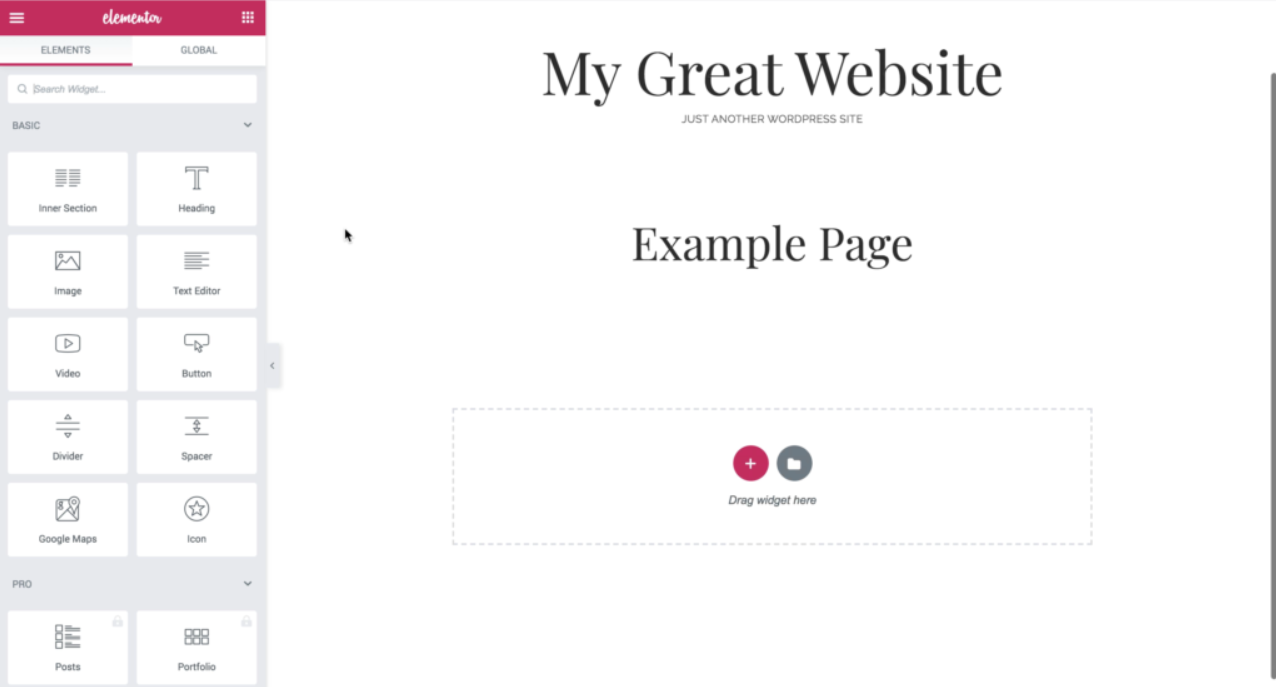
Hostinger Website Builder’s editor, scoring 7.4, is a beginner-friendly platform with a drag-and-drop interface, pre-designed templates, and visual aids for easy website creation. It offers various sections, content editing tools, SEO optimization, and ecommerce capabilities on premium plans, but has limitations in design flexibility compared to code-based platforms and may have fewer advanced features for high-volume stores. Customization options also vary based on the chosen plan.
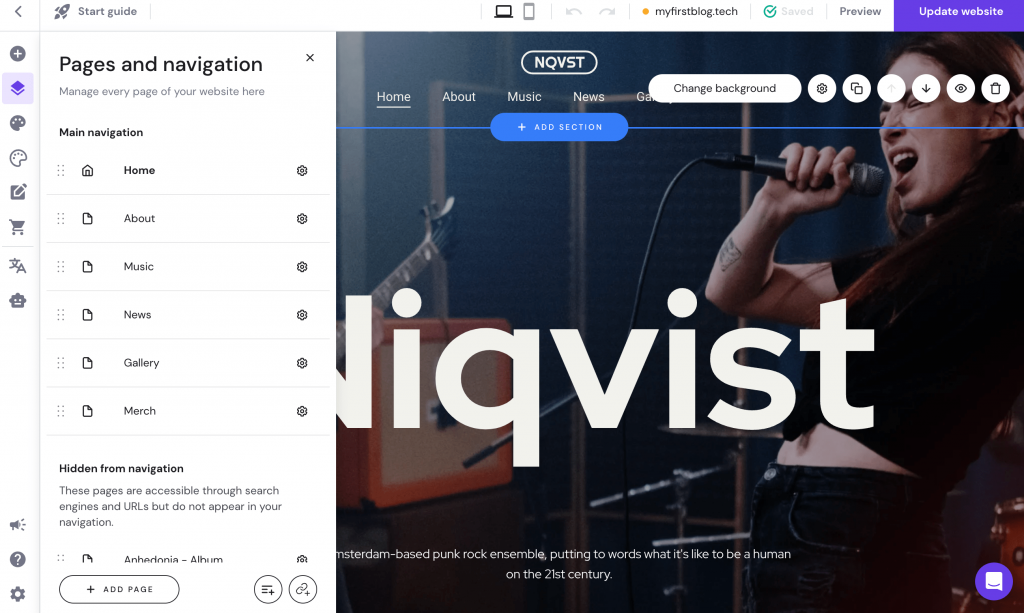
Mobile editor/app
 0
0
 5.5
5.5
🏆
Winner: Hostinger Website Builder
. Both Elementor and Hostinger Website Builder have their strengths and weaknesses when it comes to mobile editing. Elementor, unfortunately, does not have a dedicated mobile editor, which can limit its usability for users who prefer to make changes on the go.
On the other hand, Hostinger Website Builder, while not having a dedicated mobile editing app, offers a mobile-friendly interface that is directly accessible through your phone’s web browser. This allows for some level of convenience and flexibility, especially for users who prefer to make quick edits or updates to their website from their mobile device.
In summary, Hostinger Website Builder takes the lead in this category due to its mobile-friendly interface, despite not having a dedicated mobile app.
Product testing options
Product Testing OptionsAssesses the options for trying out platform features before commitment.Score Components:
- Trial quality (40%): Extent and usefulness of the trial or free version.
- Feature accessibility (30%): How many features are available to test.
- Trial duration (20%): Length of the trial period.
- Ease of transition (10%): Smoothness of moving from trial to paid plans.
 5.6
5.6
 6.7
6.7
Overall Result
:
Hostinger Website Builder wins
. Hostinger Website Builder scores 6.7, slightly higher than Elementor’s 5.6. Both platforms offer the possibility to test premium features during a refundable period, but Hostinger Website Builder has a slight edge due to its hosting capabilities.
 |
 |
|
|---|---|---|
Free Plan |
Yes, but only for self-hosted WordPress.org | No |
Trial Duration |
No | No, however they have 30 days money back guarantee |
Testing Premium Features |
It is possible to test all the premium features during the refundable period. | It is possible to test the premium features during the 30 day refundable period. |
Money Back Guarantee |
30-day money back guarantee | 30 day money back guarantee for all paid plans |
Price
PriceLooks at the cost-effectiveness and value for money of each platform.Score Components:
- Plan value (40%): What each pricing tier offers.
- Transparency and clarity (30%): Clearness of pricing structures.
- Flexibility of plans (20%): Range of options to suit different budgets.
- Hidden costs (10%): Additional expenses not included in the plan.
 8.0
8.0
 9.0
9.0
Hostinger Website Builder offers a more affordable pricing structure compared to Elementor, which is reflected in their respective price scores of 9.0 and 8.0.

|

|
|
|---|---|---|
$5-$13 |
Basic ($9.99/month): 1 website, with 10GB SSD storage, 25k monthly visitors, 30GB monthly bandwidth, daily auto backups stored for 14 days, Cloudflare CDN, and integrated caching tool. Value for price: 6.5 |
Premium website ($11.99/month): Build 1 website with 10 GB storage, 100 GB bandwidth, custom domain & email, social media integration & SEO tools. Value for price: 7.5 |
$13-$20 |
Business ($19.99/month): 1 website, with 20GB SSD storage, 50k monthly visitors, 50GB monthly bandwidth, daily auto backups stored for 30 days, Cloudflare CDN, integrated caching tool and access to staging environment. Value for price: 7.5 |
Business website builder ($13.99/month): Build 1 website with custom domain & emails, AI website builder, AI image generator, AI writer, ecommerce features, marketing integrations and 0% transaction fees. Value for price: 8.5 |
$20-$30 |
Grow ($22.99/month): 3 websites, with 30GB SSD storage, 75k monthly visitors, 75GB monthly bandwidth, daily auto backups stored for 30 days, Cloudflare CDN, integrated caching tool, access to staging environment and site cloning. Value for price: 8.5 |
No offering at this amount. |
$40+ |
Scale ($49.99/month): 10 websites, with 40GB SSD storage, 100k monthly visitors, 100GB monthly bandwidth, daily auto backups stored for 30 days, Cloudflare CDN, integrated caching tool, access to staging environment and site cloning. Value for price: 9.0 |
No offering at this amount. |
location. As a result in rare cases the prices displayed here can differ from the ones you see on their
websites.
Hosting quality
Hosting
qualityExamines the reliability and performance of the hosting solutions.Score Components:
- Uptime (40%): Consistency and reliability of website availability.
- Speed (30%): Loading times and performance.
- Bandwidth and storage (20%): Sufficiency of resources provided.
- Data centers (10%): Quality and distribution of hosting infrastructure.
 7.8
7.8
 7.2
7.2
🏆
Winner: Elementor
Both Elementor and Hostinger Website Builder offer reliable hosting services with a 99.9% uptime guarantee. However, Elementor’s Google Cloud powered hosting and daily auto backups give it an edge over Hostinger Website Builder, which requires long-term commitments for the best pricing and has higher renewal costs.
 |
 |
|
|---|---|---|
Do they offer hosting? |
Yes, included in all their plans |
Yes, included in all their plans |
Data Centers: |
1 data center in Belgium |
Data Centers across the globe: USA, Europe, Asia, South America |
Type of hosting: |
Managed WordPress Hosting |
Shared Hosting, Cloud Hosting, WordPress Hosting, VPS Hosting |
Uptime: |
99.9% |
99.9% |
Uptime Guarantee: |
Yes, 99.9% |
Yes, 99.9% |
Website Speed Optimization
Website Speed OptimizationEvaluates optimization of website loading timesScore Components:
- PageSpeed Score (30%): Google’s score indicating performance optimization.
- Loading Time (30%): The average time until a website is fully interactive.
- Mobile Optimization (15%): Optimization effectiveness for mobile devices.
- Resource Optimization (15%): Optimizing images, scripts, and other heavy resources.
- CDN Usage (10%): Use of CDN to enhance speed across geolocations.
 6.7
6.7
 8.2
8.2
🏆 Winner: Hostinger Website Builder
Both Elementor and Hostinger Website Builder prioritize website performance and page speed, but Hostinger Website Builder outperforms Elementor in this aspect.
 |
 |
|
|---|---|---|
Focus |
Lazy Loading, Code Minification, Caching, CDN |
LiteSpeed Cache, Cloudflare CDN, MariaDB database, Browser caching |
Performance Tools |
Google Lighthouse, PageSpeed Insights |
Google PageSpeed Insights Integration |
Key Strategies |
Lazy Loading, Code Minification, Caching, CDN |
LiteSpeed Cache, Cloudflare CDN, MariaDB database, Browser caching |
Load Times |
Varies depending on optimization and website complexity |
2-3 seconds average |
Page Speed Scores Range |
Varies depending on optimization and website complexity |
80-95+/100 |
Core Web Vitals Improvement |
Not disclosed |
Significant improvements in LCP, FID, and CLS through various optimizations |
Hostinger Website Builder has made significant strides in enhancing website performance and page speed. It uses LiteSpeed Cache, Cloudflare CDN, MariaDB database, and browser caching as key strategies for speed optimization.
Hostinger has also made notable improvements in Core Web Vitals (CWV) performance, successfully reducing Largest Contentful Paint (LCP) through LiteSpeed Cache and Cloudflare CDN, improving First Input Delay (FID) with server-side optimizations, and minimizing Cumulative Layout Shift (CLS) through CSS optimizations. These efforts have led to significant improvements in overall CWV scores. The average load time for Hostinger websites is 2-3 seconds, and the PageSpeed scores range from 80 to 95+ out of 100.
On the other hand, Elementor uses lazy loading, code minification, caching, and CDN as its key strategies for speed optimization. However, Elementor does not disclose any information about its Core Web Vitals improvements. The load times and PageSpeed scores for Elementor websites vary depending on optimization and website complexity.
Get a head start on website creation with AI
Create a custom website tailored to your business needs 10X faster with 10Web AI Website Builder!
Plugins and integrations
Plugins and integrationsMeasures the range and effectiveness of additional plugins and integrations.Score Components:
- Variety of options (40%): Range of available add-ons.
- Integration smoothness (30%): Ease of integrating plugins into the site.
- Quality of plugins (20%): Functionality and reliability of the options.
- Custom integration capabilities (10%): Support for custom or third-party integrations.
 7.6
7.6
 4.7
4.7
🏆 Winner: Elementor.
Elementor scores 7.6, offering a wide range of add-ons, both free and premium, that extend its functionality beyond the base version. It integrates with a broad range of tools, enhancing its functionality for marketing, CRM, and social media needs. Hostinger Website Builder, with a score of 4.7, offers around 20 free options and premium ones for individual purchase. However, it doesn’t have an external “Marketplace” for integrations, which limits its flexibility compared to Elementor.
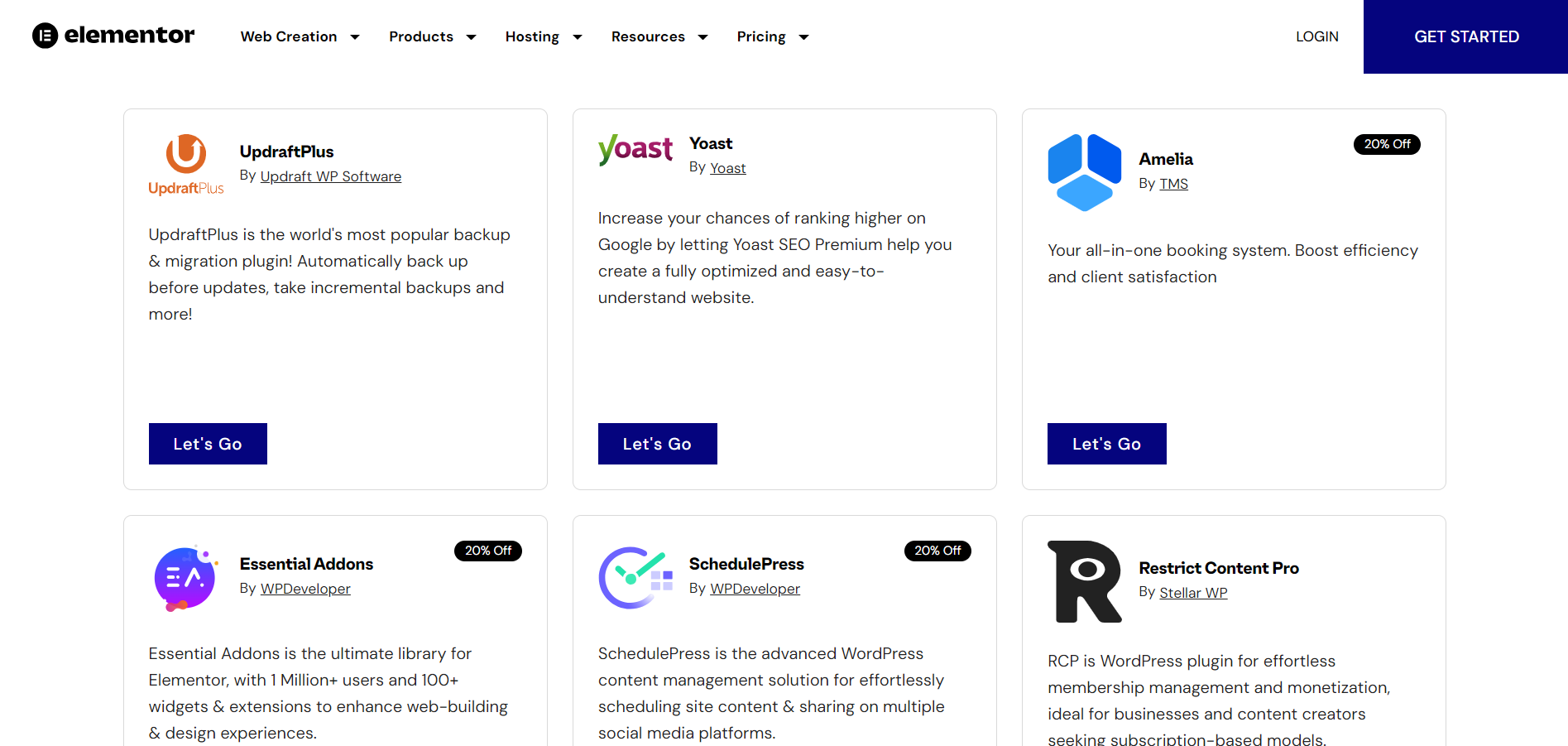
Marketing Features
Design FunctionalitiesRepresents how well each platform allows for creative design and customization of websites.Score Components:
- Template Variety (30%): Range and quality of design templates.
- Customization (30%): Flexibility and options for design alterations.
- User Interface (20%): Ease and intuitiveness of the design process.
- Responsiveness (10%): Adaptability to different devices and screen sizes.
- Innovation (10%): Unique design features and tools.
 7.8
7.8
 5.8
5.8
🏆
Overall Winner: Elementor
. Elementor stands out for its advanced marketing tools, especially in SEO, email marketing, and social media integration. Hostinger Website Builder offers basic marketing features, suitable for beginners or small businesses.
 |
 |
|
|---|---|---|
SEO Tools |
Yes, with integration of various SEO plugins |
Yes |
Email Marketing |
Yes, with integration of various email marketing services |
Yes |
Blogging |
Yes |
Yes |
Social Media Integration |
Yes, integration of social media buttons |
Simple social media links and sharing options |
Analytics and Reporting |
Yes, with integration of Google Analytics |
Basic analytics for website traffic and performance |
Ads and Promotions |
Yes |
Limited direct ad tools but supports integrations |
Customer Support
Customer supportEvaluates the quality and availability of support options.Score Components:
- Response time (40%): Speed of support responses.
- Support quality (30%): Effectiveness and helpfulness of the support.
- Availability (20%): Range of support channels (phone, chat, email).
- Resource richness (10%): Quality of self-help and educational materials.
 7.2
7.2
 7.2
7.2
🏆 Winner: Tie
. When comparing Elementor vs Hostinger Website Builder, both platforms offer robust customer support options, each scoring 7.2 in this category.
Elementor provides 24/7 support through ticketing and live chat, ensuring users can get help at any time. Their global Customer Experience agents are praised for their responsiveness and helpfulness, making it easier for users to resolve issues quickly.
Hostinger Website Builder also offers 24/7 live chat support, along with a ticketing system that promises email responses within 24 hours. Additionally, they provide phone support during specified hours in certain regions, which can be particularly useful for users who prefer verbal communication.
Both platforms excel in providing comprehensive support, making it a tie in this category.
Security
SecurityLooks at the platforms’ security measures and data protection.Score Components:
- Data protection (40%): Safeguards for user and customer data.
- SSL and encryption (30%): Implementation of secure connections.
- Compliance (20%): Adherence to industry security standards.
- Regular updates (10%): Frequency of security updates and patches.
 9.1
9.1
 8.2
8.2
🏆
Winner: Elementor
. Elementor’s security measures are robust and comprehensive, leveraging Google Cloud’s infrastructure for high security, including end-to-end encryption. They also offer advanced hosting features, including the use of Google Cloud Platform’s C2 servers and integration with Cloudflare’s Enterprise CDN, to deliver fast loading times and global reach. Elementor’s commitment to security is further emphasized by its ISO 27001 certification and a proactive Bug Bounty program, aimed at harnessing the community’s power for continuous security improvement.
Hostinger Website Builder also prioritizes security, implementing measures like encryption, regular backups, advanced firewalls, DDoS protection, and anti-malware scans. They also offer PCI-compliant hosting for ecommerce sites, with optional premium add-ons such as Sucuri Security and SiteLock for enhanced protection. However, their security measures are not as comprehensive as Elementor’s, resulting in a lower security score.
AI Capabilities
AI capabilitiesMeasures the effectiveness of AI-driven features and tools.Score Components:
- Automation efficiency (40%): Impact of AI on streamlining processes.
- Personalization (30%): AI-driven customization for users or customers.
- AI-Assisted design (20%): Role of AI in website design and functionality.
- Data analysis (10%): Use of AI in interpreting user data and analytics.
 7.4
7.4
 6.1
6.1
 |
 |
|
|---|---|---|
AI Builder |
Elementor’s AI builder generates text, custom codes, and images directly within the editor |
Hostinger’s AI Website Builder automates aspects of website creation |
AI Ecommerce features |
AI-driven features for generating container layouts, custom images, text, and code |
AI Shop Generator, automated product descriptions, smart stock management |
AI Content Generation |
AI writing assistant for creating original, brand-consistent text |
AI Writer tool for quick and easy content creation |
Additional AI Features |
Integration with third-party AI powered WordPress plugins or widgets |
AI Image Generator, AI Logo Maker, AI Heatmap, SEO Check tool |
🏆 Winner: Elementor
. Elementor, with a score of 7.4, offers a more comprehensive set of AI capabilities, including an AI builder that generates text, custom codes, and images directly within the editor. It also provides AI-driven features for ecommerce websites and an AI writing assistant for content generation.
Hostinger Website Builder, scoring 6.1, also offers a range of AI capabilities, including an AI Website Builder and AI ecommerce features. However, it falls short in terms of the breadth and depth of AI capabilities compared to Elementor.
User Management
User ManagementAssesses the platforms’ capabilities in managing user roles, permissions, and accessibility.Score Components:
- Role Customization (40%): Flexibility in creating and defining user roles and
permissions. - Ease of Management (30%): User interface and tools for managing users.
- Access Control (20%): Effectiveness of access control measures for different user
levels. - Scalability (10%): Ability to manage a growing number of users efficiently.
 8.8
8.8
 6.3
6.3
🏆 Winner: Elementor
. Both Elementor and Hostinger Website Builder offer different levels of user management, but Elementor provides more flexibility and customization.
- Elementor operates on WordPress, so the number of users who can edit or manage a website depends on the roles and permissions set within WordPress. Administrators have full access to edit any part of the site, including Elementor settings, while Editors can manage posts and pages made with Elementor. Authors and Contributors have limited capabilities. Elementor Pro offers a Role Manager feature, enabling further customization of what different roles can do within Elementor.
- The number of users who can edit a Hostinger website depends on the hosting plan and the Website Builder edition chosen. For shared hosting, the Free plan allows only 1 user, Starter allows 2, Premium allows 5, and Business offers unlimited collaborators. In Cloud Hosting, Startup allows 2, Professional allows 5, and Enterprise offers unlimited collaborators. The Website Builder Pro edition, available on all plans, allows up to 10 collaborators.
Elementor User Roles and Access Levels:
| Role | Description | Access Highlights |
|---|---|---|
| Administrator | Users with full access to all administration features, including Elementor settings. | Can edit all content, Access to Elementor settings, Can install plugins and themes, Can manage users |
| Editor | Users who can manage and publish content including pages and posts. | Can edit pages/posts created with Elementor, Cannot access Elementor settings, Can manage categories, tags, and links, Can moderate comments |
| Author | Users who can publish and manage their own posts. | Can create posts with Elementor, Cannot edit pages, Limited access to media library, Cannot access Elementor settings |
| Contributor | Users who can write and manage their own posts but cannot publish them. | Can create content with Elementor, Cannot publish or edit pages, No access to Elementor settings, Submissions require review by higher-level roles |
Additional Features
 |
 |
|
|---|---|---|
SSL Certificate |
||
Custom Domain |
||
Free Custom Domain Included |
||
International Domains |
||
Mobile Responsive |
||
Page Speed |
||
Website Builder Mobile App |
||
Convert a Website To An App |
||
Website Analytics |
||
Multilingual Sites |
||
Multiple Users |
Elementor vs Hostinger Website Builder: User Feedback
Elementor is widely appreciated for its intuitive drag-and-drop interface, enabling rapid creation of professional and responsive websites without coding skills. It offers a vast range of templates and compatibility with WordPress, making it a go-to for diverse users. Despite its benefits, concerns arise regarding website loading times, subscription costs, and occasional compatibility issues. Feedback on customer support and legacy plan management is mixed, with some users experiencing dissatisfaction. Overall, Elementor is valued for its efficiency in web development, although some aspects, particularly support services, could be improved.
Hostinger Website Builder is favored for its ease of use, affordability, and strong customer support, making it an attractive option for users, especially those new to website building. However, there are areas for improvement, particularly in offering more diverse templates, enhancing ecommerce features, and streamlining customer support responsiveness. These insights reflect a balance of satisfaction with areas that could benefit from further development.
The making of this blog
We followed a clear, step-by-step process to write and research this article.
Elementor vs Hostinger Website Builder: FAQ
Which is better for beginners, Elementor or Hostinger Website Builder?
Can I use both Elementor and Hostinger Website Builder for ecommerce?
How do Elementor and Hostinger Website Builder compare in terms of design flexibility?
What are the major differences in pricing between Elementor and Hostinger Website Builder?
Which platform offers better hosting quality, Elementor or Hostinger Website Builder?
Can I test premium features on both Elementor and Hostinger Website Builder before committing?
Which platform is better for users who need advanced marketing tools?









